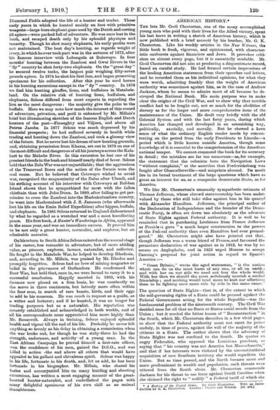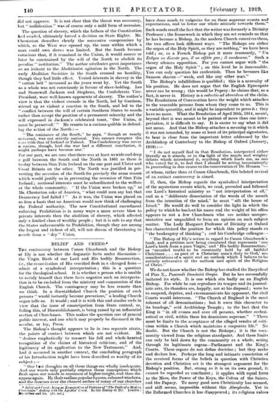AMERICAN HISTORY.*
WWI sa Into:o- ld.. reel The late Mr. Cecil Chesterton, one of the many accomplished young men who paid with their lives for the Allied victory, spent his last leave in writing a sketch of American history, which is now published with a brief memoir by his brother, Mr. G. K. Chesterton. Like his weekly articles in the New Witness, the little book is fresh, vigorous, and opinionated, with character. istie outbursts against financiers and Jews. It provokes criti- cism on almost every page, but it is essentially readable. Mr. Cecil Chesterton did not aim at producing a dispassionate record, based on careful study. He had formed certain impressions of the leading American statesmen from their speeches and letters, and he recorded them as his individual opinions, for what they were worth, admitting frankly that the weight of American authority was sometimes against him, as in the ease of Andrew Jackson, whom he seems to admire most of all because he de- stroyed the National Bank. His main purpose was to make clear the origins of the Civil War, and to show why that terrible conflict had to be fought out, not so much for the abolition of slavery as for the larger and more comprehensive issue of the maintenance of the Union. He dealt very briefly with the old Colonial System and with the last forty years, during which America has changed and developed in an astonishing way, politically, atonally, and morally. But he showed a keen sense of what the ordinary English reader needs by concen- trating on the period from the early Presidents to Lincoln—a period which is little known outside America, though some knowledge of it is essential to the comprehension of the American national temper. We cannot commend the book for its accuracy in detail ; the mistakes are far too numerous—as, for example, the statement that the colonists bore the Navigation Laws "without complaint," or the assertion that Fredericksburg was fought after Chancellorsville—and misprints abound. Its merit Ilea in its broad treatment of the largo questions which have as great an interest for us, as a composite democratic State, as for America.
We like Mr. Chesterton's unusually sympathetic estimate of Thomas Jefferson, whose shrewd statesmanship has been under- valued by those who still take sides against him in his quarrel with Alexander Hamilton. Jefferson, the principal author of the Declaration of Independence and the founder of the Demo- erratic Party, is often set down too absolutely as the advocate of State Rights against Federal authority. It is well to be reminded that in purchasing Louisiana from France Jefferson as Preside It gave " a much larger construction to the powers of the Federal authority than even Hamilton had ever promul- gated." Mr. Chesterton might also have pointed out that, though Jefferson was a warm friend of France, and favoured the premature declaration of war against ue in 1812, he was by no means an Anglophobo, and in 1823 urged Monroe to accept Canning's proposal for joint action in regard to Sprinis4 America :—
" Great Britain," wrote the aged statesman, " is the nation which can do us the moat harm of any one, or all on earth ; and with her on our side we need not fear the whole world. With her then we should the moat sedulously nourish a cordial friendship ; and nothing would tend more to knit our affections than to be fighting once more side by side in the same cause."
The question of State Rights—that is, of the extent to which the self-governing rights of a State could be pressed against the Federal Government acting for the whole Republic—was the fundamental problem of the nineteenth century. The Civil War decided once for all that no State or States could secede from the Union ; but it needed the bitter lesson of " Reconstruction "vh the South, which Mr. Chesterton describes in a few vivid pages. to show that the Federal authority must not exert its power unduly, in time of peace, against the will of the majority of the citizens in a State. The author shows that the advocacy of State Rights was not confined to the South. He quotes an angry Federalist, who opposed the Louisiana purchase, as saying that " his country was not America but Massachunette," and that if her interests were violated by the unconstitutional acquisition of now Southern territory she would repudiate the Union. But as time passed, and the North became more and more predominant in wealth and population, such threats were uttered from the South alone. Mr. Chesterton commends Jackson for his threat to use force against South Carolina when she claimed the right to " nullify " a Federal tariff of which she
did not approve. It is not clear that the threat was necessary, but " nullification 7 was of course only a mild form of secession. The question of slavery, which the fathers of the Constitution had evaded, ultimately forced a decision on Stele Rights. Mr. Chesterton describes clearly the successive compromises by which, as the West was opened up, the zone within which a man could own slaves was limited. But the South became conscious that, if it remained in the Union, it would sooner or later be constrained by the will of the North to abolish its peculiar " institution." The author attributes great importance as an irritant to the Abolitionist agitation in the North. The early Abolition Societies in the South aroused no hostility, though they had little effect. Vested interests in slavery in the " cotton belt " increased as the years went by. Yet the South as a whole was not consciously in favour of slave-holding. Lee and Stonewall Jackson and Stephens, the Confederate Vice- President, were well-known opponents of slavery. The author's view is that the violent crusade in the North, led by Garrison, stirred up as violent a reaction in the South, and led to the " conflict between the will of certain Southern States to accede rather than accept the position of a permanent minority and the will expressed in Jackson's celebrated toast, ' Our Union, it must be preserved.' " He resorts to a curious quibble in defend- ing the action of the North :—
" The resistance of the South," he says, "though so nearly universal, was not strictly national. You cannot compare the ease with that of Ireland or Poland. The Confederacy was never a nation, though, had the war had a different conclusion, it 'night perhaps have become one."
For our part, we are sure that there was at least as wide anddeep a gulf between the South and the North in 1861 as there is to-day between Sinn Fein Ireland on the one part and Ulster and Croat Britain on the other. The North was justified in pre- venting the secession of the South for precisely the same reason which would justify us in preventing the secession of Sinn Fein Ireland ; sectional interests most be subordinated to the welfare of the whole community. " If the Union were broken up," as Mc. Chesterton asks of America, " what could men say but that Democracy had failed ? " As it was, the Union was placed on so firm a basis that no American would now think of challenging the Federal authority. The new Constitutional amendment enforcing Prohibition is in many ways a more severe blow to private interests than the abolition of slavery, which affected only a limited class of wealthy people ; but it is safe to say that the States unfavourable to Prohibition, though they are among the largest and richest of all, will not dream of threatening to secede from a " dry " Union.



































 Previous page
Previous page